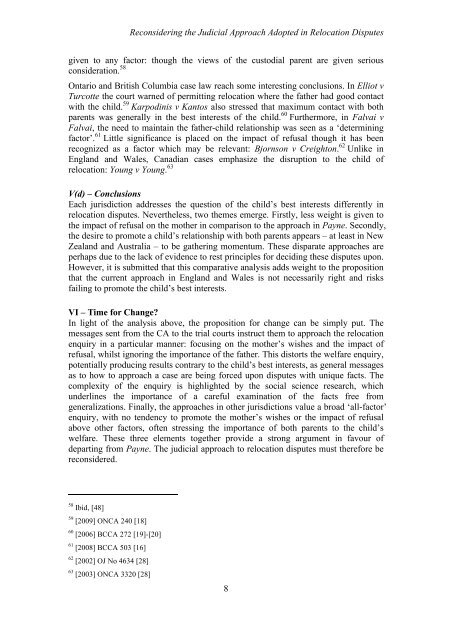Open UKLSR Volume 1(2) - Uklsa
Open UKLSR Volume 1(2) - Uklsa
Open UKLSR Volume 1(2) - Uklsa
Create successful ePaper yourself
Turn your PDF publications into a flip-book with our unique Google optimized e-Paper software.
Reconsidering the Judicial Approach Adopted in Relocation Disputes<br />
given to any factor: though the views of the custodial parent are given serious<br />
consideration. 58<br />
Ontario and British Columbia case law reach some interesting conclusions. In Elliot v<br />
Turcotte the court warned of permitting relocation where the father had good contact<br />
with the child. 59 Karpodinis v Kantos also stressed that maximum contact with both<br />
parents was generally in the best interests of the child. 60 Furthermore, in Falvai v<br />
Falvai, the need to maintain the father-child relationship was seen as a ‘determining<br />
factor’. 61 Little significance is placed on the impact of refusal though it has been<br />
recognized as a factor which may be relevant: Bjornson v Creighton. 62 Unlike in<br />
England and Wales, Canadian cases emphasize the disruption to the child of<br />
relocation: Young v Young. 63<br />
V(d) – Conclusions<br />
Each jurisdiction addresses the question of the child’s best interests differently in<br />
relocation disputes. Nevertheless, two themes emerge. Firstly, less weight is given to<br />
the impact of refusal on the mother in comparison to the approach in Payne. Secondly,<br />
the desire to promote a child’s relationship with both parents appears – at least in New<br />
Zealand and Australia – to be gathering momentum. These disparate approaches are<br />
perhaps due to the lack of evidence to rest principles for deciding these disputes upon.<br />
However, it is submitted that this comparative analysis adds weight to the proposition<br />
that the current approach in England and Wales is not necessarily right and risks<br />
failing to promote the child’s best interests.<br />
VI – Time for Change?<br />
In light of the analysis above, the proposition for change can be simply put. The<br />
messages sent from the CA to the trial courts instruct them to approach the relocation<br />
enquiry in a particular manner: focusing on the mother’s wishes and the impact of<br />
refusal, whilst ignoring the importance of the father. This distorts the welfare enquiry,<br />
potentially producing results contrary to the child’s best interests, as general messages<br />
as to how to approach a case are being forced upon disputes with unique facts. The<br />
complexity of the enquiry is highlighted by the social science research, which<br />
underlines the importance of a careful examination of the facts free from<br />
generalizations. Finally, the approaches in other jurisdictions value a broad ‘all-factor’<br />
enquiry, with no tendency to promote the mother’s wishes or the impact of refusal<br />
above other factors, often stressing the importance of both parents to the child’s<br />
welfare. These three elements together provide a strong argument in favour of<br />
departing from Payne. The judicial approach to relocation disputes must therefore be<br />
reconsidered.<br />
58 Ibid, [48]<br />
59 [2009] ONCA 240 [18]<br />
60 [2006] BCCA 272 [19]-[20]<br />
61 [2008] BCCA 503 [16]<br />
62 [2002] OJ No 4634 [28]<br />
63 [2003] ONCA 3320 [28]<br />
8


